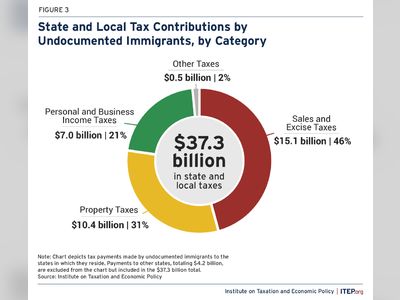
UK Government Responds to Trump's Tariffs as Economic Landscape Shifts
Downing Street acknowledges a 'new era' in global trade dynamics following US tariff announcements, prompting potential tax increases in the UK.
Downing Street has characterized President Donald Trump's recent tariff announcements as signaling a transformative shift in the global economic landscape, with implications that could necessitate tax increases for the British government.
The remarks were made following Trump's declaration, which has ignited concerns of an impending global trade war and has resulted in significant declines in stock markets.
The Prime Minister, who is set to engage with European and Commonwealth leaders in the coming days, views this trade development as a pivotal moment in history.
Labour leader Keir Starmer is preparing to address potential responses in this context.
Senior Members of Parliament (MPs) have advised Starmer to approach upcoming trade negotiations with caution, expressing concerns about making excessive concessions to the United States in a bid to avoid being perceived as overly accommodating.
They warn against moves that could liken the UK to 'the 51st US state.'
Looking ahead, the Prime Minister intends to advocate for regulatory reform and the reduction of planning restrictions to stimulate economic growth.
However, analysts express skepticism regarding the sufficiency of these measures, given the anticipated shortfall in tax revenue projected for the autumn budget due to the economic repercussions of the tariffs.
A spokesperson from Downing Street indicated the necessity for the UK to adapt to a transforming economic environment, suggesting a comprehensive overhaul of the planning system and a renewed industrial strategy.
The government remains hopeful for a trade agreement with the US that will mitigate the adverse effects of the tariffs.
Early outlines of this agreement reportedly include compromises such as a reduction in the digital services tax levied on American tech firms and lowered tariffs on certain agricultural imports.
Concerns persist among various political figures regarding the ramifications of making too many concessions.
Liam Byrne, Labour chair of the business and trade select committee, expressed that the impact of Trump's tariffs could severely harm the UK economy and diminish tax revenues by billions.
He emphasized the importance of maintaining high standards and robust competition regulations, cautioning against what he deemed risks of diminished productivity.
Alistair Carmichael, chair of the environment, food and rural affairs select committee, also urged the government to remain vigilant in negotiations that could affect agricultural policies, warning against compromising on high animal welfare and environmental standards in exchange for access to the American market.
As the discussions advance, Chi Onwurah, chair of the science and technology select committee, noted the essential role of public trust in technology policy, underscoring the notion that any advancements should prioritize the interests of the British populace.
Economists have suggested that the anticipated deceleration in global economic activity resulting from the tariffs could compel Chancellor Rachel Reeves to implement tax hikes in the upcoming budget.
Analysis from the Institute for Fiscal Studies points toward a probable need for Reeves to align with fiscal rules requiring tax increases unless significant cuts in spending are achieved.
In addition to concerns regarding economic policy, David Lammy, the foreign secretary, articulated his disapproval of the US's resurgence of protectionist measures, reflecting a sentiment not seen in global trade for nearly a century.
While Downing Street refrained from using similarly charged rhetoric, it expressed disappointment regarding the tariffs.
A spokesperson reiterated the necessity for an understanding of the changing dynamics in trade alongside security policy, marking the current transitions as emblematic of this new economic era.
The remarks were made following Trump's declaration, which has ignited concerns of an impending global trade war and has resulted in significant declines in stock markets.
The Prime Minister, who is set to engage with European and Commonwealth leaders in the coming days, views this trade development as a pivotal moment in history.
Labour leader Keir Starmer is preparing to address potential responses in this context.
Senior Members of Parliament (MPs) have advised Starmer to approach upcoming trade negotiations with caution, expressing concerns about making excessive concessions to the United States in a bid to avoid being perceived as overly accommodating.
They warn against moves that could liken the UK to 'the 51st US state.'
Looking ahead, the Prime Minister intends to advocate for regulatory reform and the reduction of planning restrictions to stimulate economic growth.
However, analysts express skepticism regarding the sufficiency of these measures, given the anticipated shortfall in tax revenue projected for the autumn budget due to the economic repercussions of the tariffs.
A spokesperson from Downing Street indicated the necessity for the UK to adapt to a transforming economic environment, suggesting a comprehensive overhaul of the planning system and a renewed industrial strategy.
The government remains hopeful for a trade agreement with the US that will mitigate the adverse effects of the tariffs.
Early outlines of this agreement reportedly include compromises such as a reduction in the digital services tax levied on American tech firms and lowered tariffs on certain agricultural imports.
Concerns persist among various political figures regarding the ramifications of making too many concessions.
Liam Byrne, Labour chair of the business and trade select committee, expressed that the impact of Trump's tariffs could severely harm the UK economy and diminish tax revenues by billions.
He emphasized the importance of maintaining high standards and robust competition regulations, cautioning against what he deemed risks of diminished productivity.
Alistair Carmichael, chair of the environment, food and rural affairs select committee, also urged the government to remain vigilant in negotiations that could affect agricultural policies, warning against compromising on high animal welfare and environmental standards in exchange for access to the American market.
As the discussions advance, Chi Onwurah, chair of the science and technology select committee, noted the essential role of public trust in technology policy, underscoring the notion that any advancements should prioritize the interests of the British populace.
Economists have suggested that the anticipated deceleration in global economic activity resulting from the tariffs could compel Chancellor Rachel Reeves to implement tax hikes in the upcoming budget.
Analysis from the Institute for Fiscal Studies points toward a probable need for Reeves to align with fiscal rules requiring tax increases unless significant cuts in spending are achieved.
In addition to concerns regarding economic policy, David Lammy, the foreign secretary, articulated his disapproval of the US's resurgence of protectionist measures, reflecting a sentiment not seen in global trade for nearly a century.
While Downing Street refrained from using similarly charged rhetoric, it expressed disappointment regarding the tariffs.
A spokesperson reiterated the necessity for an understanding of the changing dynamics in trade alongside security policy, marking the current transitions as emblematic of this new economic era.











